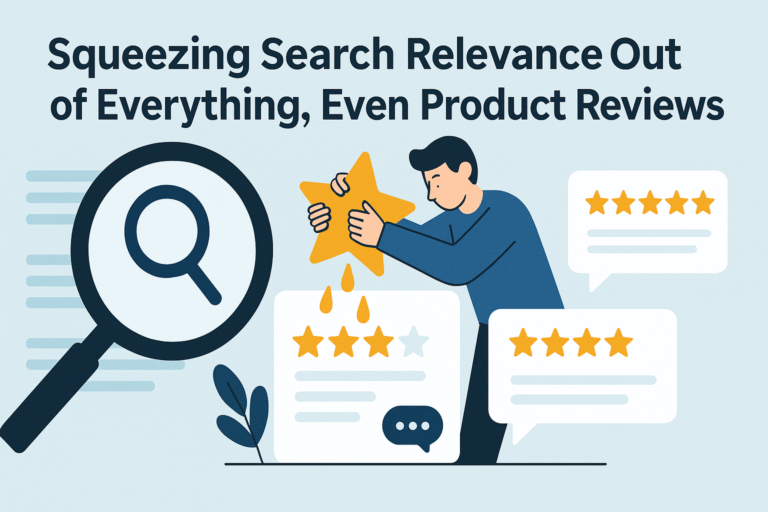Introduction: Turning Reviews into Relevance Engines
Ever wondered why some e‑commerce sites surface exactly what you want, even when you’re vague? The secret is squeezing relevance, not just from titles, but from every data point: especially product reviews. Reviews aren’t just social proof, they’re search signals. This blog dives into how to leverage them, boost UX and revenue, and why Expertrec makes it frictionless.
Why Product Reviews Matter for Search Relevance
- Rich intent context: Reviews often mention use‑cases, features, pain points, think “quiet blender for small kitchen” or “budget noise‑canceling headphones”
- Sentiment annotations: Positive vs negative reviews can inform ranking, e.g. surfacing “best value” picks when users search “affordable”.
- Synonym and colloquial clues: Slang, regional names, common misspellings, seen in user language, help extend search coverage dramatically.
How to Squeeze Relevance from Reviews: A Tactical Framework
1. Extract Entities & Keywords via NLP
Tag reviewers’ phrases, features, brand names, intents. Use NLP models to spot terms beyond product titles like “flat‑feet friendly running shoes” or “long battery vape”.
2. Map Sentiment to Ranking Logic
Use sentiment scoring: boost highly rated products with specific praise for key queries like “quiet, budget headphones,” while deprioritizing negative‑score reviews on expensive variants.
3. Train Intent Classifier Using Review Data
Classify queries by intent: “price‑conscious”, “feature‑seekers”, “gift buyers”. Reviews help train models to match queries like “value speaker under ₹3000” to the right products, even if titles lack pricing.
4. Synonym & Typos via Review Lexicon
User‑generated content gives real-world terms, e.g., “mobiles” vs “cell phones”, “earbuds” vs “ear phones”. Feed into synonyms or autocorrect rules for richer coverage.
5. Behavioral Data + Review Signals
Pair clicks, dwell time, and purchase paths with review strength. If people read reviews mentioning “durability” then purchase, elevate those products for queries like “long‑lasting blender”.
6. Continuous Audit of Zero‑Result Queries
Check searches with no results, surface if reviews suggest products that match latent demand. Perhaps someone searches “multi‑purpose juicer/food processor”, pinpoint reviews containing that phrase and adjust.
Benefits of Review‑Driven Relevance
| Benefit | Why it Works |
|---|---|
| Elevates UX | Users find intent‑fit items faster, reducing bounce rate |
| Boosts conversions | Relevant results convert better—you’re matching needs, not keywords |
| Powers discovery | Niche, long‑tail items get surfaced, turning obscure products into converts |
| Improves SEO and retention | More satisfied users revisit and search more—lower exit rate, longer sessions |
Expertrec: Contextual Review‑Aware Search Engine
Before we wrap up, here’s how Expertrec helps deliver this relevance supercharged:
- AI‑trained intent and semantic matching: goes beyond keyword to meaning—so if reviews mention “flat feet”, “value”, “quiet”, Expertrec understands and surfaces matching products accurately.
- Synonym, typo handling, and behavior‑based learning: built-in features like autocomplete, behavioral ranking and zero‑result analytics cut implementation time dramatically.
- No‑code plus manual tuning interface: you can blend AI relevance with manual merchandising tweaks using review‑derived signals in the admin panel, with instant effect.
- Integrates easily with platforms like Shopify, Magento, WordPress, WooCommerce—without replatforming your store.
Pro Tips to Start Today
- Export and parse your product reviews—tag features, sentiment, intents.
- Feed review lexicons into your synonym/taxonomy list.
- Use review sentiment signals in your ranking weighting.
- Audit zero-result searches weekly—match them to review clues and decide if indexing needs expanding.
- Track metrics: reduction in zero‑results, bounce rate from search, click‑to‑conversion ratio.
Conclusion
When you squeeze search relevance out of everything, especially product reviews, you unlock deeper intent, richer context, and sky‑high conversion potential. Reviews aren’t just social proof, they’re hidden gold for smarter, hyper‑relevant search. Tools like Expertrec let you harness that gold instantly, AI‑powered, plug‑and‑play, review‑aware search that learns, adapts and converts.
Frequently Asked Questions
Reviews contain real user language, intents, feature mentions and sentiment—providing signals that product titles alone can’t deliver.
Yes—words in negative reviews can inform ranking too, by de‑prioritizing poorly scored variants for intent queries.
Aim weekly reviews of zero‑result queries and trending search terms, syncing with new review data.
Yes—combining AI‑driven relevance with manual ranking rules ensures you promote key products or seasonal items when needed.
Expertrec doesn’t auto‑read review text, but you can feed review-derived metadata into its ranking logic—mixing AI intent matching with review signals.




